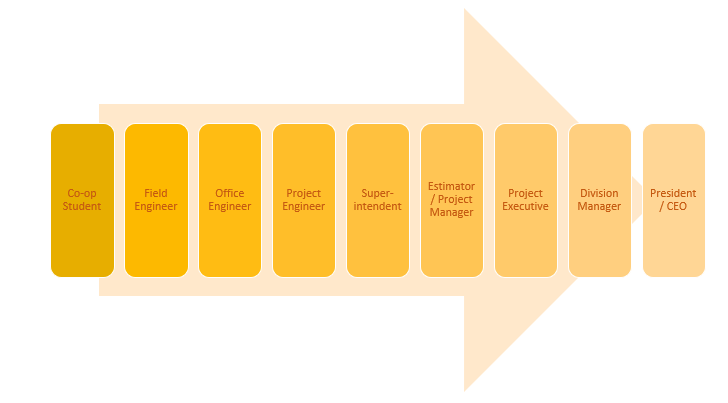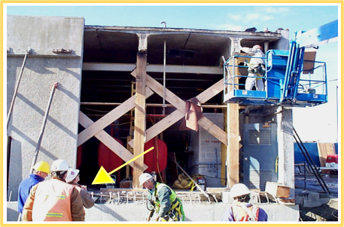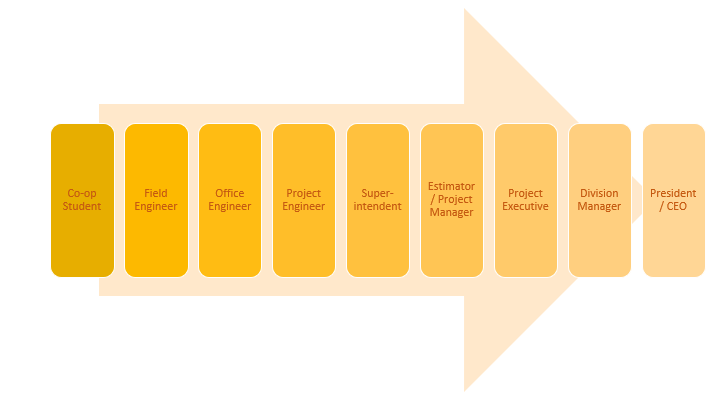Executive Summary. The career path in construction (for a construction professional, versus in the trades) is fairly standard across the board. Here’s where you can expect your career to go if you stick it out for twenty years. Or more.
The first step – college or no college? It seems there’s a lot of chatter out there in social media about the value of college. Should I go and get a construction management or engineering degree, or should I just enter the work force? The answer’s simple. If you can afford to go, go!
The most important reasons being (1) it’ll show an employer you can take on a challenge and finish it (that being the degree) and (2) you have the opportunity to dip your toe in industry and see if you like it and where you fit.
So, what’s the career path? It depends on who you work for and it depends on the opportunities presented. You could almost say, it depends on luck. One thing is for sure it’s all fed with drive.

A quickie on what each step does. Here is a quick description of each step and what it takes to be there.
- Co-op Student – co-op, short for cooperative education, is a paid internship program. If you go to a school which has a formal co-op program it’s easier to find work. You’ll do anything from clerical work to field and office engineering.
- Field Engineer – you’re out in the field doing layout, interpreting the plans, collecting concrete tickets, and directing deliveries. This also gives you the training necessary to work in the office, and in the field with the guys and gals swinging the hammers and pulling the equipment levers.
- Office Engineer – this may involve concrete lift drawings, submittal/RFI writing and tracking, material procurement and coordination with vendors, and support of the field crew by interpretation/research of the specifications and drawings.
- Project Engineer – on a large job, this likely involves supervision of staff. It will also requires invoice approving, sorting through heavier engineering issues that need resolution, scheduling, and production optimization of your crews.
- Superintendent – this is primarily a field supervision role wherein you don’t get anybody hurt and you meet or beat schedule. That’s it. You are the ringleader in assuring that material is on time and delivered to the right location on the job, the crews work at the correct pace (and safely), and that estimated productivity is achieved. The office staff and field engineers will support you in achieving these goals.

- Estimator/Project Manager – the predecessor for this role is an understanding of how things are built and the resources needed to build them. An estimator is an office role and is someone who has been in the field and, for example, seen why it takes two guys to run a sawcut machine (one on the machine and one on the shop vac sucking up slurry). A project manager is in a similar role, except he/she is closer to the field and has the ability to relate all of the lessons learned in the previous roles to project costs. An estimator projects costs while a project manager manages them in real time.
- Project Executive – this person has performed in all the roles above and sits on one job, or more than likely, more than one job. He or she is a resource to upper management on the project and can help with larger issues that may be distracting the project personnel from the “day-to-day”. This person also serves as a liaison to the corporate office.
- Division Manager – once you’ve been in the roles above, you’re ready to handle an entire division. You may be in charge of a geographical area or of a discipline of work, but you have the safety, schedule, and profit and loss responsibility of a large group of people and dollars.
- President/CEO – I think most people know this role. You are the chief executive for the entire company.

My story. The sequence described above was very similar to what I went through. I co-oped for three, 6-month stints at Drexel University and held field and office engineering roles. I came out of college as a field engineer in Philadelphia with Tony DePaul & Son and then moved into an estimator role at Balfour Beatty Construction in Austin, Texas. From Texas I went to Seattle and was a project engineer-turned-project manager. I’ve been in Hawaii for 22 years and here I’ve held roles of divisional manager and then sole owner of a construction company.
I’ve had a great career. I highly recommend this industry. You’ll learn a lot, be given a lot of responsibility, and most of the time it’s exhilarating. Work safe!
The title of this article says “90% is Your Drive”, so what is the other 10%? It’s opportunity (some may say luck). Sometimes it just comes down to being in the right place at the right time. I benefitted from that too. However, I wouldn’t have been thrown into the deep end and given the chance if I hadn’t shown that I had the drive and the work ethic (and the intelligence!).






0 Comments